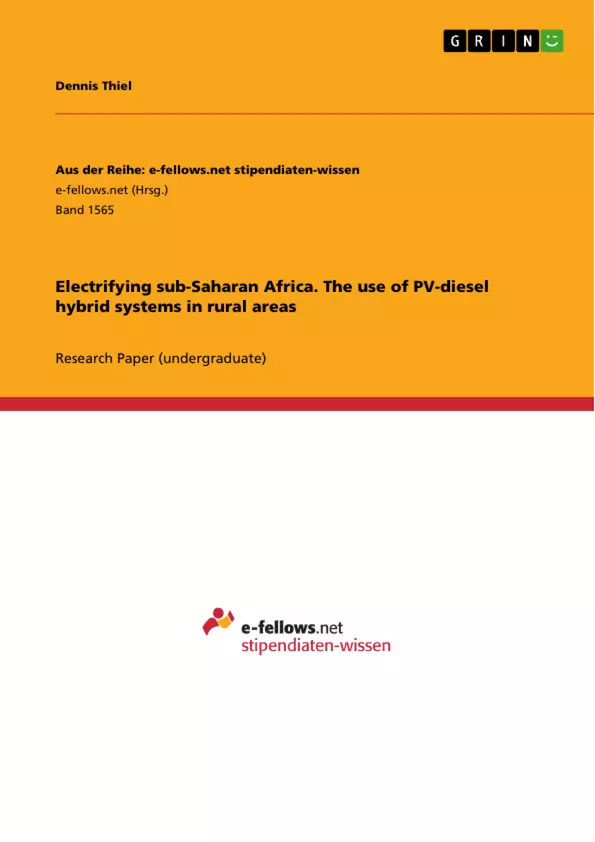The main objective of this paper is to analyse if a small scale PV-Diesel hybrid systems can be a feasible solution for electrification of a rural village in Sub-Saharan Africa. The main question is, if the hybrid system which covers a peak demand of 30 kWp can compete economically and technically with the traditional diesel power generators.
In a first step the current situation of rural electrification in Sub-Sahara Africa will be reviewed and different solutions for current electrification efforts will be analysed. Furthermore, recommendations from available case studies and literature on optimal design of hybrid systems will be considered. In a final step a simulation, by using HOMER simulation software, will compare a diesel generator solution against a PV-diesel hybrid solution regarding initial investment cost, levelized cost of electricity (LCOE), return on investment and payback.
Inhaltsverzeichnis (Table of Contents)
- Introduction
- Objective
- Current Situation of Rural Electrification
- Efforts of Rural Electrification
- Energy Demand in Rural Areas
- Solar Energy – A Possible Solution?
- PV-Diesel-Hybrid Solutions
- Investment Cost
- Operating Costs and Payback
- Components
- Case Study – Rural Village in Mozambique
- Simulation Configuration
- Optimization Results
- Evaluation of the Hybrid and Diesel-only System
- Conclusion
Zielsetzung und Themenschwerpunkte (Objectives and Key Themes)
This paper aims to determine if a small-scale PV-Diesel hybrid system can be a feasible solution for rural electrification in Sub-Saharan Africa, specifically focusing on a village with a peak demand of 30 kWp. The paper investigates whether this hybrid system can compete economically and technically with traditional diesel power generators.
- The challenges of rural electrification in Sub-Saharan Africa.
- The potential of solar energy as a solution for rural electrification.
- The technical and economic feasibility of PV-Diesel hybrid systems for rural electrification.
- The design and optimization of PV-Diesel hybrid systems.
- The comparison of PV-Diesel hybrid systems with traditional diesel power generators.
Zusammenfassung der Kapitel (Chapter Summaries)
The paper begins by outlining the current state of rural electrification in Sub-Saharan Africa, emphasizing the widespread lack of access to electricity and the reliance on traditional energy sources like biomass. Chapter 3 explores the use of diesel generators for rural electrification and the challenges associated with them, including high fuel costs and maintenance requirements. Chapter 4 delves into the potential of solar energy as a solution, considering its advantages, limitations, and the role of battery storage.
Chapter 4 focuses on PV-Diesel hybrid systems, examining their technical and economic advantages. This chapter explores the costs associated with different components of the hybrid system, including PV arrays, battery banks, inverters, and diesel generators. Chapter 5 presents a case study of a rural village in Mozambique, where a PV-Diesel hybrid system is simulated using HOMER software.
Schlüsselwörter (Keywords)
The paper focuses on rural electrification in Sub-Saharan Africa, analyzing the feasibility of PV-Diesel hybrid systems as a solution. The core concepts explored include energy access, renewable energy, solar energy, PV systems, diesel generators, battery storage, and economic analysis, particularly the levelized cost of electricity (LCOE). The study also examines the optimization and simulation of hybrid systems using HOMER software.
Frequently Asked Questions
What is a PV-Diesel hybrid system?
It is an energy system that combines photovoltaic (solar) panels with a diesel generator and battery storage to provide a reliable and cost-effective power supply.
Is solar energy feasible for rural Africa?
Yes, given the high solar radiation in Sub-Saharan Africa, PV systems are a highly potential solution for rural electrification where grid connection is unavailable.
What is LCOE?
LCOE stands for Levelized Cost of Electricity. It measures the average cost of producing one unit of electricity over the entire lifetime of the power plant.
How does a hybrid system compare to diesel-only generators?
Hybrid systems have higher initial investment costs but significantly lower operating costs due to reduced fuel consumption, often resulting in a better return on investment.
What software was used for the simulation?
The study used HOMER (Hybrid Optimization Model for Multiple Energy Resources) software to compare the economic and technical performance of the systems.
- Arbeit zitieren
- Dennis Thiel (Autor:in), 2014, Electrifying sub-Saharan Africa. The use of PV-diesel hybrid systems in rural areas, München, GRIN Verlag, https://www.hausarbeiten.de/document/305251


